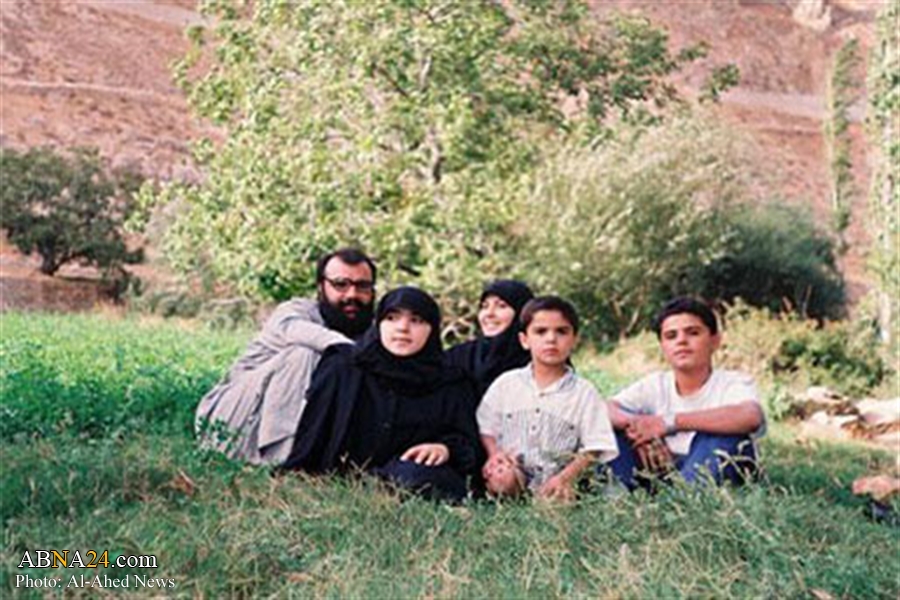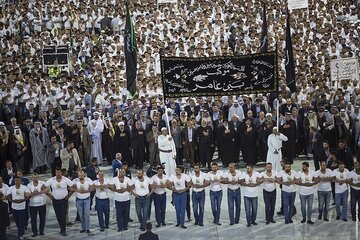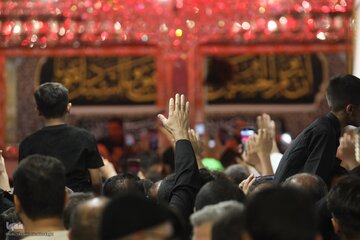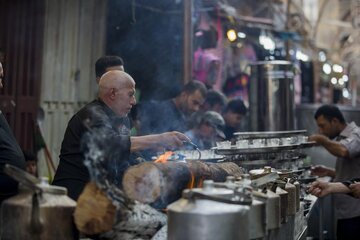AhlulBayt News Agency (ABNA): It was a dream from the book of the resistance. Almost like a passerby who left behind his basic will for future generations to follow and preserve. The martyred Secretary General of Hizbullah, Sayyed Abbas al-Musawi, stood tall, leaving behind glory, pride, and dignity for history to remember.
He was one of the lights among resistance fighters and fire to its enemies. He consciously acknowledged his responsibilities toward his faith, worldly affairs and country. Palestine is a chapter from Sayyed's story. But an attempt to count all the luminous points of Sayyed's life would be a never-ending affair.
His cousin and the brother of his wife, Sayyed Hani al-Musawi, recalls some of these points during an interview with the Al Ahed website.
He was his childhood friend. The friendship got stronger due to the bond of intermarriage. With much nostalgia, Sayyed Hani speaks about the [former] Secretary-General.
"Many things have contributed to making him a great leader. He was bold in his stances, brave in expressing his opinion, and in addition to all that he was adamant in reaching his goals as well as attached to the ultimate goal; Palestine," said Sayyed Hani.
The loving friend talked about Sayyed's attachment to "martyr Sayyed Muhammad Baqir al-Sadr, who loved and appreciated the young man after finding him conscious and thirsty to learn about religion and its provisions, and thirsty for knowledge."
"After graduating from a Hawza (a religious seminary) in Tyre, Sayyed Abbas moved to Iraq to continue his studies under Sayyed Sadr in accordance with the latter's wishes. Sayyed Sadr saw in Sayyed Abbas a distinctive character. So he treated him in a special way, getting closer, and opening up all the doors of his knowledge," Sayyed Hani adds.
He continues by touching on Sayyed Abbas's visits to Lebanon, throughout that period.
"He used to come on religious occasions like the month of Muharram and Ramadan in order to preach. Back then, knowledge or religious sciences were not widespread among the people. The son of the Bekaa region, who lived through its hardships, had a special place among the people. He was their good example. He contributed to educating the ‘private groups' that took his place preaching during his absence," Sayyed Hani explains.
"Sayyed Abbas would return home from time to time to take in the facial features of the people he loved, and desired this to be part of his future, which would be filled with sacrifice and giving and grow to love life," he continues.
According to Sayyed Hani, his dear friend "was diligent in his work. He did not give in to fatigue easily. As for his car, it was his second home in which he used to sleep during his journeys from the south to the Bekaa Valley or the north or Syria. He was always on the move accompanied by the motto of giving. He devoted his youth for the Palestinian cause. With every minute of his life, he pursued it and raised its banner among the public."
Sayyed Hani does not forget the leader's companion on this path; a lady that Sayyed Hani was more closely attached to than his own brothers.
She was the "family darling, good hearted, and the most beautiful girl in form and substance.
And because men of purity are for women of purity, God brought together Siham al- Musawi and Sayyed Abbas. The engagement took place in the presence of a number of scholars. Since that time, Sayyed was never alone in his travels. His cousin, Siham al- Musawi, accompanied him to Iraq. She became Mrs. Um Yasser after their wedding, and she was fourteen years old."
According to Um Yasser's brother, the relationship between both martyrs was pure. "I've never seen them happier," Sayyed Hani recalls. He remembers the sacrifices and dedication of his sister with her husband, who was always away. "She used to take his place and assume full responsibility. She was content. He never heard her complain about the harsh conditions or her husband's risky work. Instead she endowed her life to his jihad to get nearer to God."
To talk about Um Yasser is a never-ending affair. She was the one that "proved her awareness and competence while in the company of Sayyed. She was the watchful eye and the hand that arranged his affairs. Sayyed reciprocated the respect and appreciated her patience. He was supportive of her, which enabled Um Yasser - despite all the responsibilities - to build the Sayyeda Zahra (AS) Hawza for women as well as the Hawza of Imam Al Montathar for men which Sayyed Abbas al- Musawi founded when he was forced to return from Iraq."
Both Hawzas [religious schools] had a significant impact on the revival of the pillars of religion in the Bekaa Valley. The city of Baalbek saw the rise of religion and jihad. Which later expanded into several other areas of Lebanon.
"One day I expressed my concern to Sayyed Abbas al-Musawi over the people's growing despair and the deteriorating situation. Despite my pessimism, he responded with reassuring words and confidence in God saying, ‘the turban and martyrdom will be victorious'" Sayyed Hani added, "He felt that his martyrdom would be an awakening point for the masses. In fact, Sayyed al- Musawi's martyrdom formed a revolt against injustice."
The eye of the enemy was watching the [former] Secretary-General of Hizbullah.
"We used to joke with him saying, ‘if you sold yourself to God, do not subject your companions to danger. He would always answer us that he was doing what he must and leaves the rest to God Almighty," Sayyed Hani said.
The [former] Secretary-General, who was elected to his post in May 1991, was sensitive towards the oppressed and the resistance fighters. After his election, he stressed that this choice "is an obligation and not an honor."
He was always worried that the position would take him away from feeling the worries of the resistance fighters. Soon Sayyed's wish and constant intuition that Um Yasser would be his companion in achieving his dream came true. That dream, which he repeated with his melodious voice as he raised his hands to the sky, "I ask you to bless me with a pure martyrdom, I chose for myself in expiation for my sin; a unique martyrdom where my body disintegrates."
God Almighty heard and answered Sayyed's call.
/129
16 February 2021 - 07:34
News ID: 1115866

It was a dream from the book of the resistance. Almost like a passerby who left behind his basic will for future generations to follow and preserve. The martyred Secretary General of Hizbullah, Sayyed Abbas al-Musawi, stood tall, leaving behind glory, pride, and dignity for history to remember.




